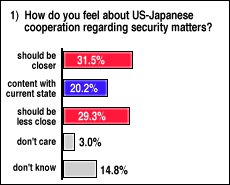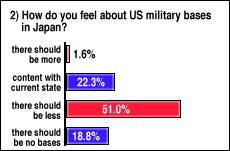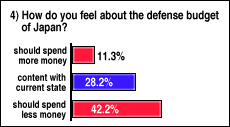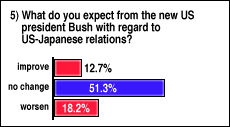US-Japanese strategic relation
     |
The issue of US-Japanese strategic co-operation has been causing high emotions and even violent unrest in the past, and it remains a hot and controversial issue in the beginning of the new century. In our first question we asked the survey participants very generally how they feel about the US-Japanese co-operation regarding security matters. About one third (32%) responded that Japan should co-operate more closely with the United States. Another third of respondents (29%) replied that Japan should co-operate less closely with the United States while 20 percent indicated to be content with the current situation. The remaining respondents (18%) did not express an opinion on this matter. A clear difference can be observed in the opinions between the genders, as the percentage of men in favour of a less close co-operation with the United States (35%) is much larger than that among women (19%).
A central issue in US-Japanese strategic co-operation are US military bases in Japan. The issue has been causing emotions go high, especially in Okinawa where most of the bases are located and because incidents of misbehaving US servicemen are quite frequent. In our second question we asked the survey participants how they feel about US military bases in Japan. A large majority of 70 percent replied that the number of bases should be reduced, with 19 percent indicating that there should be no more bases at all. Men were slightly more critical towards the bases than women. On the other hand, less than a quarter indicated to be content with the current number of US bases in Japan.
Another related and highly controversial issue is article nine of the Japanese constitution. As the whole constitution, it has basically been written by Americans during the occupation of Japan and expresses that Japan renounces war as a means to settle international disputes forever, and that Japan is not allowed to maintain military forces. Since the occupation, there always has been a political movement to change the constitution, however, it has not succeeded until today, because a large part of the Japanese population stands behind the constitution. According to our survey results, 71 percent do not want article nine to be changed, and only 19% are in favour of changing it. Again, a large difference in opinions can be observed between the genders. Women are much more strongly in favour of the current article nine (78%) than men (63%).
Despite article nine of the constitution, Japan has been maintaining a self defence force since the occupation days. In our next question we asked the participants how they feel about Japan's defence budget. The most frequent response (42%) was that the government should spend less money on defence. On the other hand, only 11 percent are in favour of increasing the defence budget. 28 percent indicated to be content with the current situation.
In our last questions we asked the participants about their expectations of the new US president Bush with regard to US-Japanese relations. A majority of 51 percent do not expect the relations to change much with the arrival of the new president. 18 percent replied that they expect the relations to worsen under George W. Bush, while 13 percent expect the opposite.
Questions? Ask in our forum.

